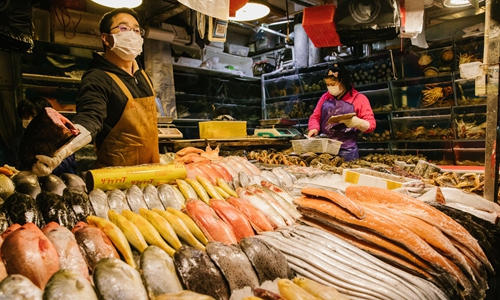Will more Chinese cities suspend imports of frozen meat, seafood to ward off COVID-19?
Source: Global Times Published: 2020/8/16 22:28:40
Will more cities suspend frozen meat imports to ward off COVID-19?

A seafood vendor solicits customers in Beijing's Sanyuanli Market in February. Photo: Li Hao/GT
The Guangzhou Cold Chain Industry Association called for the suspension of imports of frozen meat and aquatic products from COVID-19 stricken countries and regions, and it also asked that all employees who came in contact with the contaminated products have got weekly nucleic acid tests, after a rise in coronavirus cases related to imported frozen food.
Experts held mixed views on whether the ban might be extended to other cities in the province over safety concerns.
There have been growing concerns about the safety of frozen food after an employee of Alibaba's Freshippo, a fresh food grocery store chain in Shenzhen, South China's Guangdong Province, contracted COVID-19.
The city also found two batches of frozen chicken wings imported from Brazil that tested positive for the virus Thursday.
According to the Guangdong Health Commission, three samples, out of 145,900 in total, of imported frozen food in Guangdong have tested positive for the novel coronavirus since June.
Other cities in China are also expected to roll out similar policies to ban the import of frozen food from COVID-19 stricken areas amid growing concerns that the source of the infections may be the food products, Mei Xinyu, a research fellow with the Chinese Academy of International Trade and Economic Cooperation under the Ministry of Commerce, told the Global Times.
"Cold chain logistics is likely to be an important channel for the spread of the virus. The low temperature and humidity provide a suitable long-term survival environment for the virus," he said.
Since July, at least 10 cases in China have related to frozen food products, including chicken wings imported from Brazil and shrimps from Ecuador that tested positive for the virus, media reported.
"These multiple cases raised concerns of possible issues during cold chain transportation, as epidemic prevention and control methods in some foreign countries are not as strict as those in China," Mei added.
Cui He, president of the China Aquatic Products Processing and Marketing Alliance, told the Global Times Sunday that a total ban on imported frozen food is not practical.
"More than 100 countries worldwide export frozen seafood to China. The major exporting countries such as the US and Brazil are in the middle of the coronavirus outbreak," Cui said.
Cui said that he does not believe that the suspension of seafood imports from pandemic countries via Guangzhou would have much impact on business for either exporters or importers, because there are many other port cities in China that may still import seafood.
In the first half of 2020, China's imports of aquatic products dropped 9.3 percent year-on-year to $7.91 billion, data from the Ministry of Agriculture and Rural Affairs showed.
Newspaper headline: Will more cities suspend frozen meat imports to ward off COVID-19?
Posted in: INDUSTRIES,BIZ FOCUS